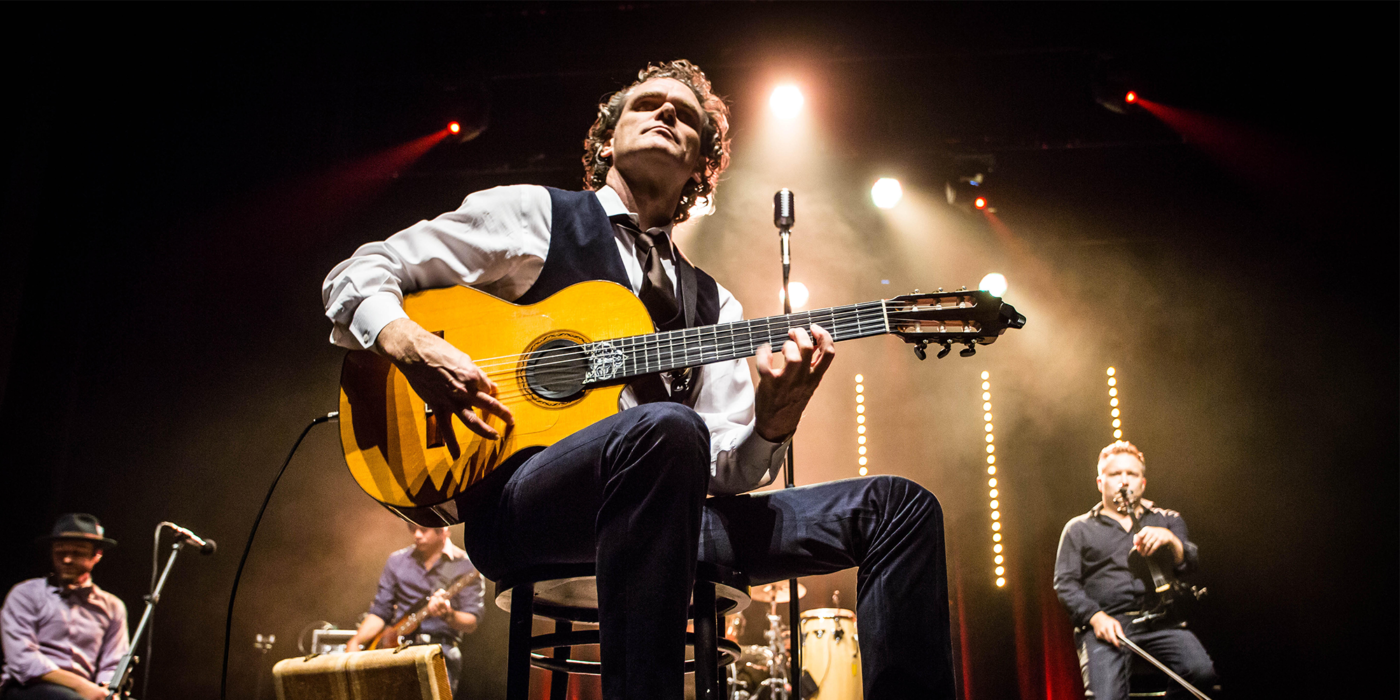The Toronto music scene is brimming with far-reaching musical genres and artists unique to the city, at least according to master guitarist Jesse Cook. After all, it is touted as one of the most multicultural cities in the world. Brazilian drums, Persian melodies, Indian mridangam, Samba beats, and Flamenco are some of the sounds that have fused into the music of this Juno Award-winning artist. These influences and his love for cross-cultural connection have inspired over ten albums and world tours. This month, we spoke to Jesse about an unexpected encore early on in his career, and what it was like to play at the first jazz festival in Saudi Arabia.
Parvati Magazine: Your music is influenced by many sounds and genres. Have you found there are misconceptions about your style and the kind of artist you are?
Jesse Cook: Totally. Most people will hear what I’m doing and go, “Oh, it’s Flamenco.” I even see it on Wikipedia. If you go to Spain and you play [my] music, they’ll say, what is this? They don’t recognize it as Flamenco because it’s not, it’s a hybrid. I love Flamenco, but I also love world music, jazz, pop, Brazilian Samba, and Persian music.
My music is fused with a multicultural concept that is very Canadian. When I started, there weren’t a lot of people doing it. I feel like every year, the world of music is becoming more multicultural.
Parvati Magazine: You’ve said you like music that “provides a common ground for different traditions.” How have this openness and curiosity evolved over your career?
Jesse Cook: My introduction to blending music was Peter Gabriel when I was a teenager. Most people think of “Sledgehammer”, “Shock the Monkey”, the pop hits. He also created Real World Records. He was a champion for world musicians and gave them a platform. [On his] soundtrack for “The Last Temptation of Christ” he worked with musicians from North Africa, Persia, the Middle East, and created this beautiful tapestry of music, and I fell in love with it. As a composer in my early twenties I kept experimenting with that.
Growing up in Toronto, I was ideally placed to pursue those interests. I went to York University and everybody was studying south Indian mridangam and tabla, so I studied Indian drumming. Then a friend started a West African drumming ensemble [and] my friend Rick Lazar started a Brazilian percussion school called Samba Squad. When I made my record, the idea of bringing a drum set player was boring. [I said,] let’s bring all kinds of rhythms and see what happens.
Parvati Magazine: You’ve said that musicians from all over the world can be found in Toronto. What do you feel sets it apart from other cities where you’ve performed?
Jesse Cook: We’ve been doing this fusion thing a little longer, and it’s not just the fusion, it’s the love of it.
Parvati Magazine: In the past, you’ve said, “I don’t fall in love with music as much as I’d like to. When I do fall in love with an album, I’ll play it forever.” What does it take for you to fall in love?
Jesse Cook: There’s some magical quality that touches you. Sometimes it’s a groove that’s so infectious. I keep going back to emotional honesty. If you can find a way to speak to your heart with music, maybe that’s the litmus test.
Parvati Magazine: You’re going on tour this fall in Canada and the US, and that continues until the winter. What have been some highlights as a touring musician?
Jesse Cook: Early on in my career, I went to the Catalina Island Jazz Festival. [The performance slots were] already booked. My record label snuck me in and I was playing in a bar downstairs from the main show. The place caught on fire. Suddenly it was packed. By the end of that weekend, they called me up onto the main stage for the all-star jam. When the announcer mentioned my name, I got a ten-minute standing ovation. It was shocking.
I have to say what amazes me is how similarly people react despite being in different countries and cultures. Last year, we played the first jazz festival in Saudi Arabia. People were dancing. There were women, men, and children having fun, and it did not fit into my view of what Saudi Arabia would be like or how people would respond to music. You realize, music has something to teach us about how beautifully we can all come together.
Juno Award-winning guitarist Jesse Cook studied classical guitar at the Royal Conservatory of Music and York University, and jazz at Berklee College. Cook explores the roots of flamenco, and its many offshoots, from India to Spain, and on to Cuba and Latin America. Along the way, he developed his signature synthesis of world music.
Image credit: Allan Clark












